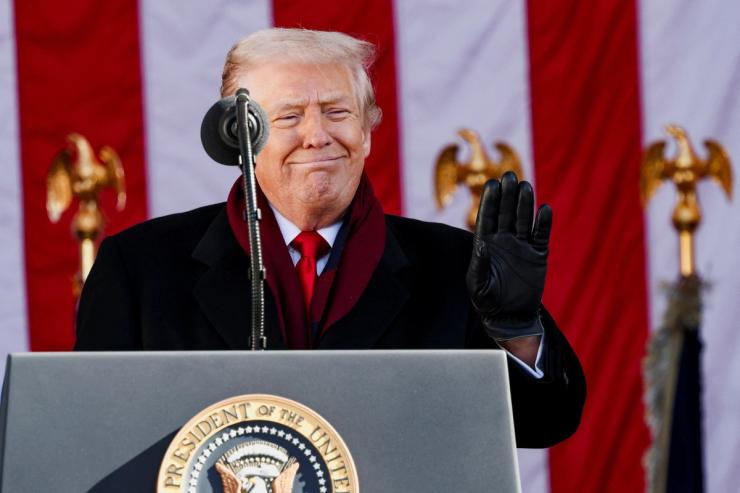The News
As his administration worries that voters have soured on the US economy, Donald Trump is returning to one of his favorite concepts: giving money directly to Americans.
Trump is continuing to propose $2,000 tariff rebate checks to many Americans, a bid to redistribute the revenue his widespread levies have generated. He’s also recently floated converting money that would have funded health insurance tax credits into direct payments.
At the start of his second term, the president entertained an idea promoted by Elon Musk, who ran the cost-cutting Department of Government Efficiency at the time, to give Americans “DOGE dividends” that would be marketed as returning its savings to the people.
It’s a tune as familiar to Trump as “YMCA” and his other favorite songs. During the early weeks of the pandemic, he put his name on the $1,200 checks that millions of people received in the spring of 2020.
One senior White House official said the focus on direct payments is all part of Trump’s “populist way.” But it’s also highly unlikely that the president could make good on any of his direct payment plans without Congress, where he’s played a relatively hands-off role during the government shutdown and where Republicans would have a tough time steering his ideas past their slim majorities.
Trump’s advisers underscore that he’s serious about his ideas, though they aren’t committing to timetables for either his tariff or health care proposals.
“It’s more money in people’s pockets and giving them the freedom to choose what they want to do with that,” the White House official said, describing Trump’s direct payment plans as “just another iteration” of other campaign-trail proposals that did become law, like tax breaks for tipped and overtime workers.
Yet unlike those tax breaks, direct payments would run a significant risk of worsening inflation at a time when Trump’s advisers are touting better numbers on that front than his predecessor. And experts in trade and health care policy are warning that the president’s latest ideas are unrealistic at best.
Scott Lincicome, vice president of general economics at the libertarian-leaning Cato Institute, called the tariff rebate idea “pretty much Fantasyland.”
“It runs into a whole list of problems,” said Lincicome. “The first one is math, a stubborn thing, but still exists. Your tariff revenue overall is bringing in about $30 billion a month. A single round of rebate checks would run $600 billion, so you’re basically taking about two years of tariff revenue completely off the table with just one of these rebate checks.”
On the health care payments front, Larry Levitt, the executive vice president for health policy at the nonpartisan organization KFF, said that “administratively, you could make” Trump’s proposal work, but “there are so many questions” about its implementation.
“How much money would each person get? What could it be used for?” Levitt asked in an interview.
“If these health care accounts that President Trump is talking about could be used to buy insurance, unregulated by the ACA — so things like short-term plans, associated health plans, insurance that doesn’t cover pre-existing conditions — it could very well end up upending the whole ACA and creating a death spiral on premiums in the ACA marketplaces,” he added.
White House spokesperson Kush Desai said in a statement that Trump would “deliver on his Day One priority of turning around Joe Biden’s affordability crisis and dead-end economy. Self-proclaimed experts should hold on their half-baked analyses until the administration releases concrete policy proposals instead of baselessly speculating what the details of the president’s proposals are.”
In this article:
Know More
Trump’s penchant for proposing checks for taxpayers — regardless of the situation — goes back more than a decade, according to longtime Trump confidant and first-term aide Michael Caputo.
When Trump weighed a run for governor of New York in 2014, Caputo recalled to Semafor, he took a number of private meetings with policy advisers who laid out the tough economic reality for many voters.
At that time, Trump “discovered just how much the taxpayer was being confiscated,” Caputo said. “He would come back with rhetorical answers, over and over again: ‘Why don’t we just give the money to the taxpayer? Why are they doing this?’
“There was a policy realization during his time considering a run for governor of New York that taxation is confiscation, and the taxpayer needs to get that money back,” added Caputo, who advised him in 2014 on the candidacy he ended up not pursuing.
Trump’s first-term interest in direct payments went beyond pandemic stimulus checks; he also floated an idea to send $200 Medicare cash cards to senior citizens to use for prescription drug payments.
As part of the Republican megabill that Trump signed in July, many children will also receive an investment account with $1,000. That idea wasn’t Trump’s originally — it was added to the law by Texas Sen. Ted Cruz — but his party has since renamed them “Trump Accounts.”
Room for Disagreement
Treasury Secretary Scott Bessent suggested on Wednesday that Trump’s tariff rebate idea would have some limits on the direct payments, such as an income cap of $100,000 per family — though he noted that those numbers are not final. Bessent had indicated in an earlier TV interview that the tariff rebates might not come in the form of direct payments.
Lincicome said that an income cap for the rebates “helps a little bit with the math issue,” but argued that the numbers still don’t add up.
Shelby’s view
An underappreciated aspect of these Trump proposals is that often the president raises an idea without fully reading in the rest of his advisers. You saw that play out in real time with Bessent’s response on the tariff rebate idea.
But unlike in his first term, Trump now has a team around him that’s fully committed to his agenda — so don’t expect the internal pushback to his more unorthodox suggestions that he often faced then.
The biggest reason that Trump’s direct payment ideas might not get off the ground is Congress. His administration would have to pour a lot of political capital into getting even one of them passed into law, and even then success isn’t guaranteed.
Notable
- Trump is “committed” to his tariff checks and has his economic advisors “looking into it,” White House press secretary Karoline Leavitt told reporters on Wednesday.
- Republicans are urging Trump to focus more on domestic than foreign policy in the wake of Tuesday’s election results, Semafor reported last week.


